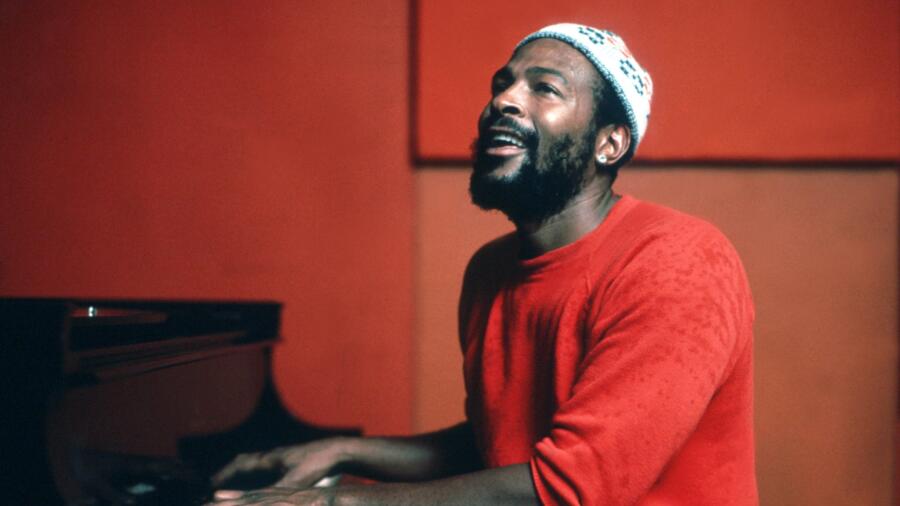“I got what I wanted. I couldn’t do it myself, so I made him do it.”
— Marvin Gaye’s reported final words
On April 1, 1984, the world lost one of its most soul-stirring voices—and Motown lost its most tormented star. The man behind hits like Let’s Get It On, What’s Going On, and Sexual Healing met an end so unthinkable it sent shockwaves around the world: Marvin Gaye was murdered by his own father—just one day shy of his 45th birthday.
But behind the music, the velvet voice, and the stage charisma was a man waging a private war with trauma, depression, and deep emotional wounds inflicted by the very man who took his life.
A Childhood Forged in Fear: The Birth of Genius in a House of Pain
Born in Washington D.C. in 1939, Marvin Pentz Gay Jr. was raised in a deeply religious home dominated by his father, Reverend Marvin Gay Sr. A strict Pentecostal minister with a violent temper and fragile ego, the elder Gay controlled his family with an iron hand, a leather belt, and a warped sense of righteousness.
Marvin was beaten regularly, humiliated in front of his siblings, and constantly told he would “never be anything.” Yet through this chaos, he discovered his sanctuary—music.
He added the “e” to his surname as a tribute to Sam Cooke and to distance himself from his father. But no spelling change could ever erase the emotional scars left by a man consumed by jealousy, insecurity, and hypocrisy.
The Rise of a Motown Megastar
By the late 1960s, Marvin Gaye had become a household name, his soulful voice defining a generation. From smooth love songs to politically charged anthems like What’s Going On, he was a rare artist who combined emotional vulnerability with cultural consciousness.
But even as he scaled musical heights, his personal life was unraveling. The death of his beloved duet partner, Tammi Terrell, from a brain tumor in 1970, shattered him emotionally. He plunged into a long, silent depression, isolating himself and questioning the value of his fame.
Drugs, Divorce, and a Spiritual Crisis
Fame brought adoration, but also addiction. Marvin became dependent on cocaine, which fueled paranoia, financial chaos, and violent outbursts. Two divorces, IRS lawsuits, and a faltering career pushed him to the edge. His spiritual crisis deepened, and by 1981, he attempted suicide—only to be saved by his brother Frankie.
In 1983, Marvin released Sexual Healing, a global hit that reignited his career—but he was unraveling fast. Seeking refuge, he moved back into his parents’ home in Los Angeles—a decision that would prove fatal.
April 1, 1984: A Violent End to a Beautiful Voice
That morning, Marvin stepped into a heated argument between his parents. His father was verbally abusing his mother, Alberta, as he had done for decades. This time, Marvin intervened.
“You don’t talk to my mother like that,” he yelled—and reportedly pushed and punched his father in rage.
A few hours later, Reverend Gay walked into Marvin’s bedroom, lifted a revolver Marvin had given him for protection, and shot him in the heart. As Marvin slumped to the floor, his father fired again, point-blank into his shoulder.
“I didn’t mean to do it,” he later claimed.
But to Alberta, his mother, his face told another story:
“He looked like a man who had gotten something off his chest,” she said.
A Chilling Pattern: Fathers Who Kill Their Sons
Filicide—the murder of a child by a parent—is rare. But when it does happen, it often involves fathers killing sons out of resentment, rivalry, or control. In Marvin Gaye’s case, all three motives were present.
Reverend Gay hated Marvin’s success, especially his connection to women, fame, and wealth. He resented Marvin’s role as his wife’s emotional anchor, and he was never able to reconcile his failure with Marvin’s triumph.
“If you cross me, I can take you out,” he once warned Marvin. And he did.
The Aftermath: A Nation in Mourning, a Family in Ruins
The world grieved Marvin Gaye’s death, unable to comprehend how such a voice of love and unity could be silenced by familial hatred.
Reverend Gay received a six-year suspended sentence and five years probation due to his age and poor health. He died in 1998, never once expressing remorse.
Meanwhile, Alberta Gay died in 1987 of cancer—heartbroken and haunted.
Marvin’s brother, Frankie, who had been by his side during his final moments, later died by suicide, unable to cope with the trauma.
A Voice That Never Fades
Despite the tragedy, Marvin Gaye’s music endures. His influence shaped not just soul and R&B, but pop, hip-hop, and jazz. Artists from Prince to Kendrick Lamar to Adele cite him as inspiration. His socially conscious lyrics and sensual rhythms remain timeless, poignant, and revolutionary.
In 1987, he was posthumously inducted into the Rock and Roll Hall of Fame, his legacy forever cemented. Streets, memorials, and even schools now bear his name.
But the story of his death still casts a shadow—a reminder that greatness doesn’t always protect us from the demons within or those closest to us.

